Pakistan confirms counterattack against India has begun
Pakistan officials have confirmed its counterattack against India has started under the name Operation Bunyan Ul Marsoos, meaning “wall of lead” in Arabic.
As our newly updated full report says, Pakistan’s retaliatory strikes – after accusing India of targeting three of its military bases – are a major escalation of the brewing conflict between the two nuclear-armed neighbours.
Pakistan’s military spokesperson said in a live broadcast on state television early on Saturday that India had targeted Nur Khan base, Murid base and Shorkot base.
Shah Meer Baloch and Hannah Ellis-Petersen report that Nur Khan air base in Rawalpindi, where the military has its headquarters, is about 10km from the Pakistani capital, Islamabad. Video shared on social media showed flames and smoke billowing into the night sky.
The early morning strikes on Nur Khan in Rawalpindi, a densely populated area, caused mass panic, with residents running into the streets.
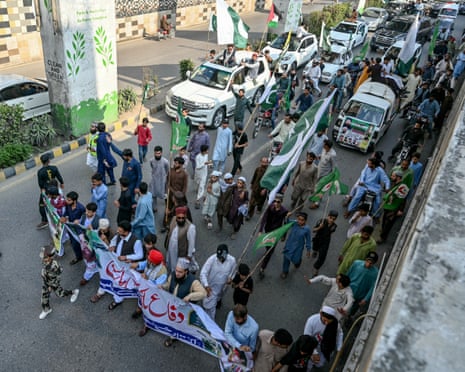
India’s attempted strikes on Rawalpindi and other key military bases – and the launch of Pakistan’s counterattack on Saturday – marks the steepest escalation in their confrontation yet, bringing the two countries the closest they have been to war in decades.
See the full report here:
Key events Show key events only Please turn on JavaScript to use this feature
More here on the US secretary of state’s calls to top Indian and Pakistani diplomats amid the flaring conflict – just days after US vice-president JD Vance was reported as saying the US would not intervene and the fighting between the two countries was “fundamentally none of our business”.
Marco Rubio urged India and Pakistan to restore direct communication to “avoid miscalculation” in a series of calls, the state department said early on Saturday.
Rubio placed telephone calls to the rivals’ foreign ministers and, for the first known time since the conflict erupted, also spoke with Pakistan’s army chief, Col Asim Munir. considered the country’s key powerbroker, Agence France-Presse reports.
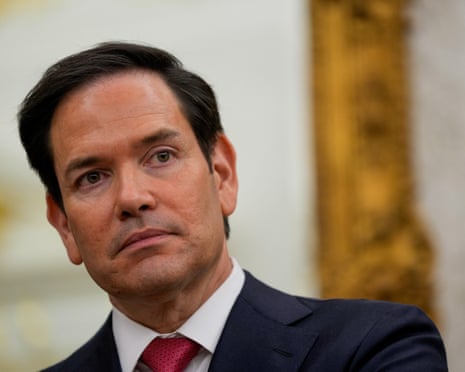
In the separate calls with the top diplomats, Rubio “emphasised that both sides need to identify methods to de-escalate and re-establish direct communication to avoid miscalculation”, state department spokeswoman Tammy Bruce said.
In the conversations with both foreign ministers and Asim Munir, Rubio also “offered US assistance in starting constructive talks in order to avoid future conflicts”, Bruce said.
The stepped-up diplomacy came as the conflict intensified between the nuclear-armed neighbours, with Pakistan launching counterattacks after India struck three of its air bases, according to officials.
Pakistan airspace shut for 24 hours
Pakistan’s aviation authority says its airspace is to remain closed for the next 24 hours, AFP just reported.
Pakistan says it will consider stopping if India does
Pakistan’s foreign minister has told local television that if India stops here then “we will consider to stop here”, Reuters is reporting.
Ishaq Dar also said he had told the US secretary of state, Marco Rubio, that the ball was in India’s court when it came to de-escalation.
Rubio said both parties had to find ways to de-escalate and re-establish direct communication to avoid miscalculation, the US state department said.
The Indian military, meanwhile, reiterated a commitment not to escalate the conflict provided that was reciprocated by the Pakistani military.
India said limited damaged was sustained to equipment and personnel at some Indian military bases that were hit.
It also said the claim that its missiles had struck Afghanistan were false.
Pakistan boosting troop numbers on border, says India
Pakistan is increasing its deployment of troops along the border, the Indian military said on Saturday.
The Pakistani army has been observed to be moving its troops into forward areas, “indicating offensive intent to further escalate the situation”, an Indian military spokesperson told the media briefing in New Delhi.
“Indian armed forces remain in a high state of operational readiness,” Reuters quoted her as saying.
Indian armed forces reiterate their commitment to non-escalation, provided it is reciprocated by the Pakistan military.
The Indian military has said at a media conference it targeted Pakistani military bases after Islamabad fired several high-speed missiles at multiple Indian air bases in the country’s Punjab state early on Saturday.
Indian colonel Sofiya Qureshi said in New Delhi just now that Pakistan also targeted health facilities and schools at its three air bases in Indian-controlled Kashmir.
“Befitting reply has been given to Pakistani actions,” she said.
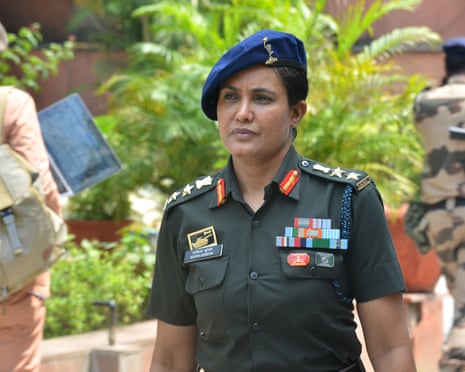
The Pakistani army’s actions were “provocation” and India’s response was “measured”, said foreign secretary Vikram Misri, cited by the Associated Press.
Pakistani defence minister denies meeting over nuclear weapons planned
Pakistan’s defence minister, Khawaja Asif, has told ARY TV that no meeting of the National Command Authority is scheduled.
It was reported earlier that Pakistan’s prime minister had convened a meeting of the authority, the main body that makes decisions on the control, command and operations of Pakistan’s nuclear weapons.
Asif also said the United States was the one country that could play an effective role between Pakistan and India.
Indian military gives media briefing
India’s military claims Pakistan has targeted medical and educational facilities in Indian-administered Kashmir as well as using a missile to target an airbase in Punjab.
It also said Pakistan attempted air intrusions in 26 locations, Reuters reports.
The Indian military said it responded by targeting radar systems and technical bases in Pakistan.
More on Beijing’s call for India and Pakistan to avoid escalating their conflict: a Chinese foreign ministry spokesperson said in a statement cited by AFP:
We strongly call on both India and Pakistan to give priority to peace and stability, remain calm and restrained, return to the track of political settlement through peaceful means and avoid taking actions that further escalate tensions.
The latest India-Pakistan fighting was triggered by an attack on the Indian-run side of Kashmir that killed 26 tourists and which Delhi blamed on Pakistan, also accusing the Lashkar-e-Taiba group of involvement.
But what exactly is Lashkar-e-Taiba (LeT) and what is its relationship with Islamabad?
Peter Beaumont describes in this explainer how it is a long-established Islamic salafist militant group founded in Pakistan and designated as a terrorist group by many countries. Its 2008 attack on Mumbai killed 166 people, including a number of foreign nationals.
The UN security council says LeT has conducted “numerous terrorist operations” against military and civilian targets since 1993, including attacks on Mumbai commuter trains in July 2006 and a December 2001 attack on India’s parliament.
The group has focused much of its militant activity in the disputed Himalayan territory of Kashmir, largely because of its proximity to India, but LeT has a broader hostility to India.
The full explainer is here:
China has “strongly” urged India and Pakistan to avoid escalating their conflict, AFP is reporting.
Residents have been taking shelter amid artillery shelling overnight in Poonch district, in Indian-administered Jammu and Kashmir.
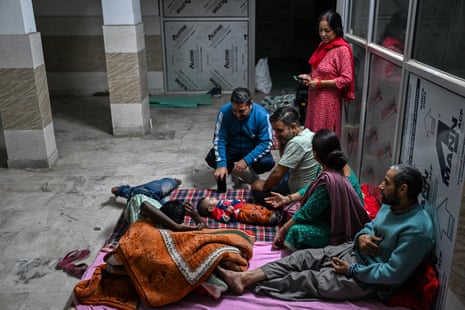
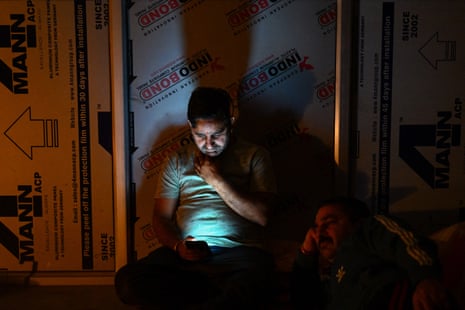
Five people have been killed in Pakistani attacks in India’s Jammu region on Saturday morning, according to police in India-administered Kashmir, cited by Reuters.

.png) 2 hours ago
5
2 hours ago
5













































